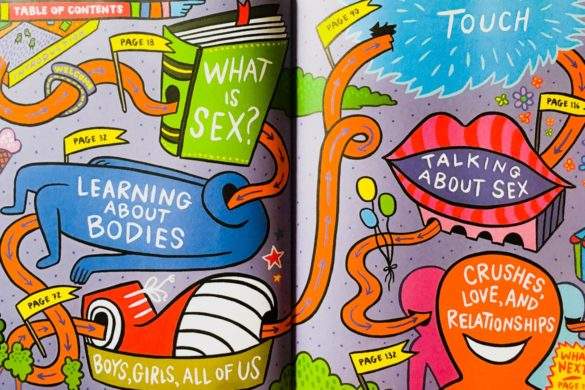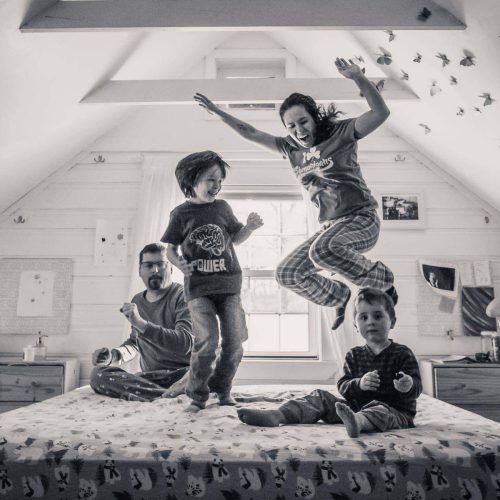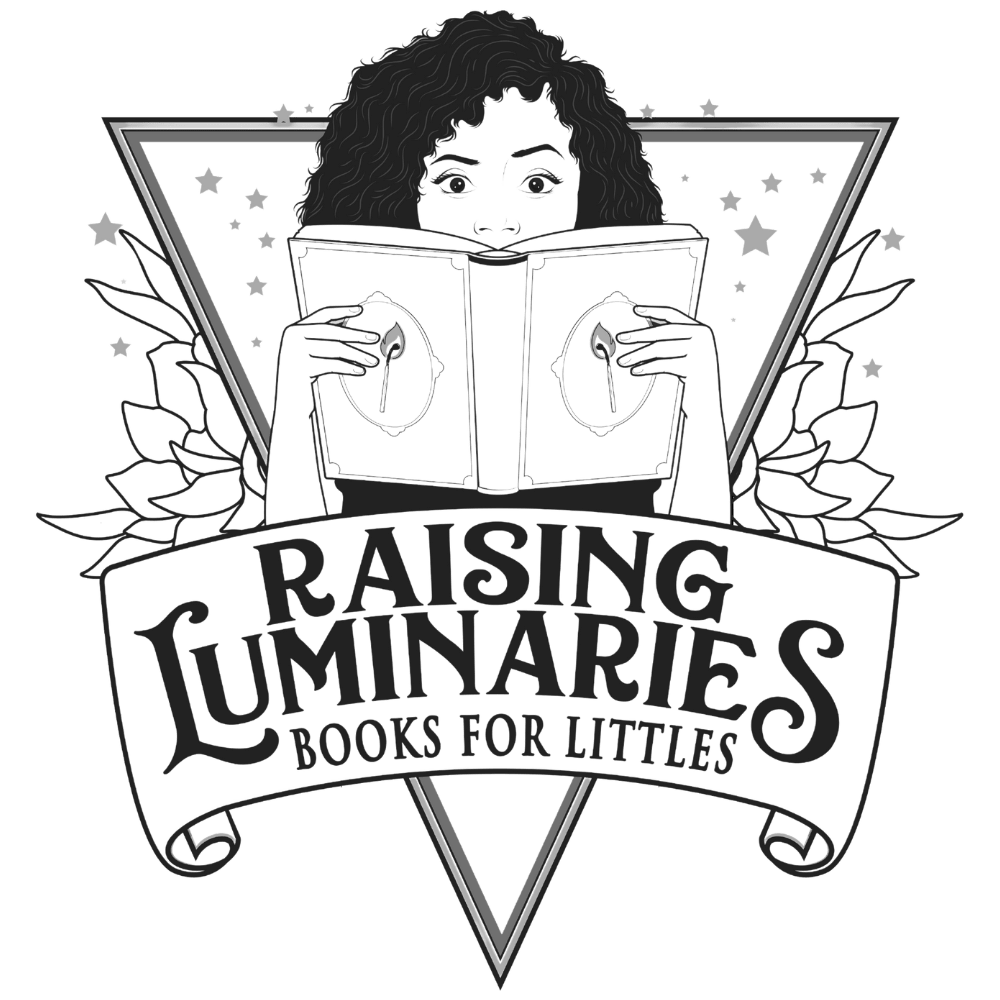[Image description: Table of Contents from Sex Is A Funny Word, by Cory Silverberg & Fiona Smyth. Topics include ‘What is sex?,’ ‘Learning About Bodies,’ ‘Boys, Girls, And The Rest Of Us,’ ‘Touch,’ ‘Talking About Sex,’ and ‘Crushes, Love, And Relationships.’]
Not sure how to explain sexuality with your kids? If you’re looking for inclusive, age-appropriate books to talk about sexuality and non-reproductive sex, you’ve arrived at the right place.
Raising Luminaries is free and accessible for readers who can’t afford a paywall. Posts may contain affiliate links, which allow me to earn a commission at no extra cost to you. Check out the full affiliate disclosure along with my statement of accountability.
203: Talking About Sex Beyond Reproduction
Open, honest discussions start early
Sex for fun! Masturbation! Human Rights For Sex Workers!
Now that I’ve scared off all the squeamish readers, let’s teach our kids how to have a healthy, sex-positive relationship with themselves and others.
Assuming we can keep kids sheltered from the existence of healthy, recreational sex is silly. Around 6 (give or take many years), it’s normal and healthy for kids to get curious and excited about sexual feelings, masturbation, and learning about others.
Be open, honest, and direct from the very beginning
Refusing to talk about sex, particularly the exciting parts of it, sets our kids up to feel ashamed of their experiences and their curiosity. Staying silent also opens them up to be exploited and abused (or become abusers) because they don’t know how to set healthy boundaries.
You Might Also Like: 6 Mistakes We Make Raising Sons – Preventing Sexual Assault
Books For Littles(BFL) is free and accessible for readers who can’t afford a paywall. Posts may contain affiliate links, which allow me to earn a commission at no extra cost to you. Check out the full affiliate disclosure along with the BFL statement of accountability.
 Top Pick – If you read only one book, make it this one.
Top Pick – If you read only one book, make it this one.
Sex Is A Funny Word
This mostly flies over my 4-year-old’s head, but for my 6-year-old, it’s a wonderful resource introducing curiosity, sexuality, and masturbation in a sex-positive way.
The Little Earthquakes already know about sexual reproduction, but we need to discuss what healthy sex looks like. From playground talk, media ads, and natural biological curiosity – they’ll realize that sex isn’t solely for reproduction even if we refuse to talk about it.
My 6-year-old needs to know that his curiosity is normal and healthy, and what is acceptable and unacceptable when it comes to how we treat ourselves and others.
This book discusses gender beyond a binary, acknowledges that all people – including people of color, people with disabilities, and the elderly, have desires & sexual identities.
It also directly and honestly addresses sexual abuse and consent – something all kids need to know as they head into elementary school – the age of sleepovers, playing ‘doctor,’ and staying in the care of adults outside their security network.
 Most Thorough For Exploring Sexual Identity
Most Thorough For Exploring Sexual Identity
A Kid’s First Book About Sex
+ Workbook: The PlayBook For Kids About Sex
This one is a little tough to find (it’s no longer in print) and could use a second-edition. BUT! If you’re looking for a book that takes you step-by-step into discussing sexuality, masturbation, and sex for pleasure, this is the most direct, unapologetic book about sex for prepubescent kids you’ll ever find.
Printed in the early 80’s, these books erase intersex and trans kids and assume a gender binary, with statements such as, “Every boy has a penis and every girl has a clitoris.” This is outdated and false.
Despite that – this considerate steps to clearly and simply provoke self-reflection and acceptance is awesome and helps kids sort out their curiosity and feelings, encouraging them to discuss what they’re thinking about with a safe adult to figure out what feels right to them.
 Best For Survivors With A History Of Sexual Abuse
Best For Survivors With A History Of Sexual Abuse
Tell Me About Sex, Grandma
This book is very different from the other books listed in this post. It’s full of metaphor, and it’s vague. To quote from the publisher description, “The dialogue focuses on the dynamics of sex, rather than the mechanics.”
I am autistic, and the Earthquakes are both under 7. We need concrete clarity – so it’s not for us. But I’m really glad it exists. Higginbotham’s work is innovative and I love her other books.
The broad metaphor is by design – this book gives survivors of sexual abuse a gentle way to discuss non-reproductive sex with kids, without specifics that could make that discussion too painful.
For older kids and neurotypical families (if you don’t know what ‘neurotypical’ means, it means you), particularly ones who aren’t comfortable using language on anatomy, naming orgasms and lust, that sort of thing – this is a great book to start with.
You Might Also Like: Love Is Love Is Love – Kids Books With Diverse Family Constellations
 Best For Older Teens & Adults
Best For Older Teens & Adults
Drawn To Sex: The Basics
If you’re teaching your kids about sex, it’s probably a good idea to brush up on your own misunderstandings and biases first.
The authors of the web comic Oh Joy Sex Toy have compiled all the sex education 101 resources they’ve created over the years (plus other new stuff) into a 3-book series that publishes in November 2018.
This will probably have some problematic issues – but the makers have consistently remained open to criticism and learning, plus they actively boost the voices of marginalized artists, promote fat liberation, body acceptance, disability visibility, and LGBTQ+ issues. This is the comic for everyone who has been raised to feel ashamed of their body and sexuality (so basically, everyone.)
 Problematic & Overdue For A New Edition (2014 Edition Not Recommended)
Problematic & Overdue For A New Edition (2014 Edition Not Recommended)
It’s Perfectly Normal
This is the standard classic book on puberty and body changes for kids. The trouble is that it fosters the illusion of being inclusive without actually including the voices of intersex, nonbinary, and trans folks.
It’s a big book with a LOT of problems, including the willful misgendering of trans folks, and it’s time to either update it to be more inclusive, or retire it.
We are happy retiring it – there are way better options above. Unlike the problematic erasure of nonbinary and intersex kids in A Kid’s First Book About Sex, in which the 80’s publication just doesn’t even realize that these kids are normal, this one casually misgenders trans kids and insists on talking about them, without them. If you’ve read my series on non-disabled people writing books about disability, you know how I feel about this. With the maker’s reputation as an inclusive author, they should have known better for the 2014 edition.

 Something To Keep In Mind
Something To Keep In Mind
How Mamas Love Their Babies
This isn’t a sex education book, but this topic should be on your radar.
I’m not saying you need to start discussing the tricky situation of decriminalizing the exploitative sex industry while protecting sex worker’s human rights…but…maybe just teach them that sex workers are people?
While the text doesn’t mention sex work, the author explains that mamas sometimes wear uniforms (from baggy to tight, like a scuba diver’s) and some mamas dance, with images showing platform shoes and a stripper pole, and on a later page, a hotel bed.
This is amazing – because many mamas do have to/choose to support their babies with a career in the sex industry, and these women deserve the same credit for the hard work they do caring for their children.
They ALSO deserve access to the same healthcare, education, worker’s rights, and safety my family has access to – something they’re not going to get if we insist they stay invisible.
Feminists should support decriminalizing sex work. Here’s why.
Stay Curious, Stand Brave & Foster Shame-Free Sexuality










